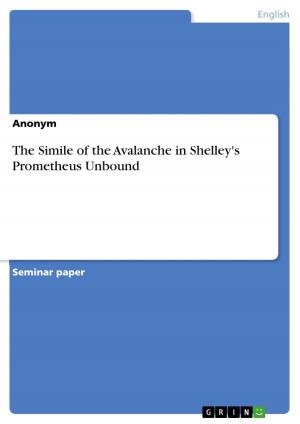Quantifying Variation of the Expanded Form in English
Nonfiction, Reference & Language, Study Aids, ESL, Foreign Languages| Author: | Mandy Stein | ISBN: | 9783640226146 |
| Publisher: | GRIN Publishing | Publication: | December 9, 2008 |
| Imprint: | GRIN Publishing | Language: | English |
| Author: | Mandy Stein |
| ISBN: | 9783640226146 |
| Publisher: | GRIN Publishing |
| Publication: | December 9, 2008 |
| Imprint: | GRIN Publishing |
| Language: | English |
Seminar paper from the year 2007 in the subject English - Grammar, Style, Working Technique, grade: 3,0, University of Göttingen, 4 entries in the bibliography, language: English, abstract: The use of the Present/Past Progressive or as some people call it: Expanded Form (EF)in English is part of the curriculum in schools and every students either native speaker of English or a learner of it as a foreign-language must learn this part of English grammar. Next to German, where it is sometimes undefined when you do/did a specific task it is specified in English by the progressive form. If you did something next to another action happening you have to use the Progressive tense or if you are doing something at the moment, like the reader of this term paper is reading at the moment. The topic of this term paper is the quantifying variation of the progressive tense during its development from Old English to Modern English. Therefore I will use works by Nehls, Denison and Strang on that specific field and combine them in their resources with Visser which is one of the richest sources of older English to find out if there are differences or one expands. First, I am going to give a short summary of the work by the three authors. Second, I will give an overview over the source constructions of the Progressive Form (I will use the term 'Expanded Form as well as 'Progressive' because the composers switch between the two terms). In chapter three I will have a closer look on the Modern use of the Expanded Form in English and in a fourth step I will combine the old and modern usage of it to find out what was left or included during the years. In chapter five I will have a closer look on the mini-corpus-studies by Mossè and Nickel, who dealt with the emergence of the progressive and show what changed since they started research on this field. And finally, I will draw a conclusion about the position of the Expanded Form. [...]
Seminar paper from the year 2007 in the subject English - Grammar, Style, Working Technique, grade: 3,0, University of Göttingen, 4 entries in the bibliography, language: English, abstract: The use of the Present/Past Progressive or as some people call it: Expanded Form (EF)in English is part of the curriculum in schools and every students either native speaker of English or a learner of it as a foreign-language must learn this part of English grammar. Next to German, where it is sometimes undefined when you do/did a specific task it is specified in English by the progressive form. If you did something next to another action happening you have to use the Progressive tense or if you are doing something at the moment, like the reader of this term paper is reading at the moment. The topic of this term paper is the quantifying variation of the progressive tense during its development from Old English to Modern English. Therefore I will use works by Nehls, Denison and Strang on that specific field and combine them in their resources with Visser which is one of the richest sources of older English to find out if there are differences or one expands. First, I am going to give a short summary of the work by the three authors. Second, I will give an overview over the source constructions of the Progressive Form (I will use the term 'Expanded Form as well as 'Progressive' because the composers switch between the two terms). In chapter three I will have a closer look on the Modern use of the Expanded Form in English and in a fourth step I will combine the old and modern usage of it to find out what was left or included during the years. In chapter five I will have a closer look on the mini-corpus-studies by Mossè and Nickel, who dealt with the emergence of the progressive and show what changed since they started research on this field. And finally, I will draw a conclusion about the position of the Expanded Form. [...]















